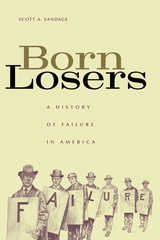
What makes somebody a Loser, a person doomed to unfulfilled dreams and humiliation? Nobody is born to lose, and yet failure embodies our worst fears. The Loser is our national bogeyman, and his history over the past two hundred years reveals the dark side of success, how economic striving reshaped the self and soul of America.
From colonial days to the Columbine tragedy, Scott Sandage explores how failure evolved from a business loss into a personality deficit, from a career setback to a gauge of our self-worth. From hundreds of private diaries, family letters, business records, and even early credit reports, Sandage reconstructs the dramas of real-life Willy Lomans. He unearths their confessions and denials, foolish hopes and lost faith, sticking places and changing times. Dreamers, suckers, and nobodies come to life in the major scenes of American history, like the Civil War and the approach of big business, showing how the national quest for success remade the individual ordeal of failure.
Born Losers is a pioneering work of American cultural history, which connects everyday attitudes and anxieties about failure to lofty ideals of individualism and salesmanship of self. Sandage's storytelling will resonate with all of us as it brings to life forgotten men and women who wrestled with The Loser--the label and the experience--in the days when American capitalism was building a nation of winners.
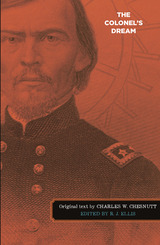
Charles Waddell Chesnutt (1858-1932) was an African American writer, essayist, Civil Rights activist, legal-stenography businessman, and lawyer whose novels and short stories explore race, racism, and the problematic contours of African Americans’ social and cultural identities in post-Civil War South. He was the first African American to be published by a major American publishing house and served as a beacon-point for future African American writers.
The Colonel’s Dream, written in 1905, is a compelling tale of the post-Civil War South’s degeneration into a region awash with virulent racist practices against African Americans: segregation, lynchings, disenfranchisement, convict-labor exploitation, and endemic violent repression. The events in this novel are powerfully depicted from the point of view of a philanthropic but unreliable southern white colonel. Upon his return to the South, the colonel learns to abhor this southern world, as a tale of vicious racism unfolds. Throughout this narrative, Chesnutt confronts the deteriorating position of African Americans in an increasingly hostile South. Upon its publication The Colonel’s Dream was considered too controversial and unpalatable because of its bitter criticisms of southern white prejudice and northern indifference, and so this groundbreaking story failed to gain public attention and acclaim.
This is the first scholarly edition of The Colonel’s Dream. It includes an introduction and notes by R. J. Ellis and works to reestablish this great novel’s reputation.
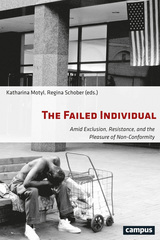

From Thomas Jefferson to John Rawls, justice has been at the center of America’s self-image and national creed. At the same time, for many of its peoples-from African slaves and European immigrants to women and the poor-the American experience has been defined by injustice: oppression, disenfranchisement, violence, and prejudice.
In Identity and the Failure of America, John Michael explores the contradictions between a mythic national identity promising justice to all and the realities of a divided, hierarchical, and frequently iniquitous history and social order. Through a series of insightful readings, Michael analyzes such cultural moments as the epic dramatization of the tension between individual ambition and communal complicity in Moby-Dick, attempts to effect social change through sympathy in the novels of Lydia Marie Child and Harriet Beecher Stowe, Ralph Waldo Emerson’s antislavery activism and Frederick Douglass’s long fight for racial equity, and the divisive figures of John Brown and Nat Turner in American letters and memory.
Focusing on exemplary instances when the nature of the United States as an essentially conflicted nation turned to force, Michael ultimately posits the development of a more cosmopolitan American identity, one that is more fully and justly imagined in response to the nation’s ethical failings at home and abroad.
John Michael is professor of English and of visual and cultural studies at the University of Rochester. He is the author of Anxious Intellects: Academic Professionals, Public Intellectuals, and Enlightenment Values and Emerson and Skepticism: The Cipher of the World.
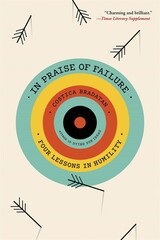
A New York Times Book Review Editors’ Choice
“Charming and brilliant.” —Times Literary Supplement
“Provocative, stimulating, wise―the book that our success-obsessed age needs to read.”―Tom Holland
“Bradatan, a philosopher, writes with elegance and wit, his every thought and sentence slipping smoothly into the next…I was absorbed by Bradatan’s book even—or especially—when I felt uncomfortable with its implications.” —Jennifer Szalai, New York Times
“Bradatan wears his erudition lightly. He is a pleasure to read, and his prose conveys a happy resilience in the face of life’s inevitable contradictions. His lessons in humility remind us that the pursuit of success is often motivated by the dread of failure—and that our attempts to create things are often driven by an avoidance of our mortality.” —Michael S. Roth, Washington Post
“Bradatan writes with the same daring, the same interpretive anger that made his subjects notorious in their own day for choosing failure over what their respective worlds counted as success. A gripping read, start to finish.” ―Jack Miles, author of God: A Biography
Our obsession with success is hard to overlook. Everywhere we compete, rank, and measure. Yet this relentless drive to be the best blinds us to something vitally important: the need to be humble in the face of life’s challenges.
In Praise of Failure explores several arenas of failure, from the social and political to the spiritual and biological. Gleefully breaching the boundaries between argument and storytelling, scholarship and spiritual quest, Costica Bradatan mounts his case for failure through the stories of four historical figures who led lives of impact and meaning and assiduously courted failure. Their struggles show that engaging with our limitations can be not just therapeutic but positively transformative.
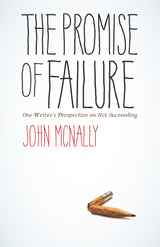
The Promise of Failure is part memoir of the writing life, part advice book, and part craft book; sometimes funny, sometimes wrenching, but always honest. McNally uses his own life as a blueprint for the writer’s daily struggles as well as the existential ones, tackling subjects such as when to quit and when to keep going, how to deal with depression, what risking something of yourself means, and ways to reenergize your writing through reinvention.
What McNally illuminates is how rejection, in its best light, is another element of craft, a necessary stage to move the writer from one project to the next, and that it’s best to see rejection and failure on a life-long continuum so that you can see the interconnectedness between failure and success, rather than focusing on failure as a measure of self-worth. As brutally candid as McNally can sometimes be, The Promise of Failure is ultimately an inspiring book—never in a Pollyannaish self-help way. McNally approaches the reader as a sympathetic companion with cautionary tales to tell. Written by an author who has as many unpublished books under his belt as published ones, The Promise of Failure is as much for the newcomer as it is for the established writer.

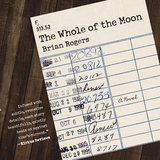
An actor sits poolside waiting to hear whether he has been cast in a television pilot. Two kids ditch school in 1964 and go for a hike in the woods that turns dangerous. A woman named Dot remembers her husband who spent years working on a musical adaptation of The Great Gatsby. A young woman Felicity deals with the consequences of an unexpected pregnancy. Mike, a former high school star, attends an open tryout for the California Angels baseball team. And a boarding school teacher tells the story of his cousin, a social climber who has disappeared in the wake of a murder. These are the characters that populate The Whole of the Moon. Brian Rogers’ novel is about determination and failure and life in Southern California away from the red carpet.
READERS
Browse our collection.
PUBLISHERS
See BiblioVault's publisher services.
STUDENT SERVICES
Files for college accessibility offices.
UChicago Accessibility Resources
home | accessibility | search | about | contact us
BiblioVault ® 2001 - 2024
The University of Chicago Press









